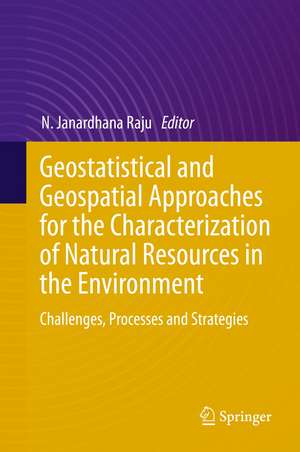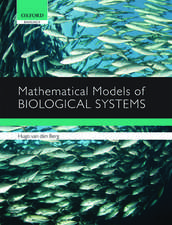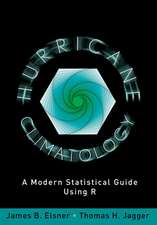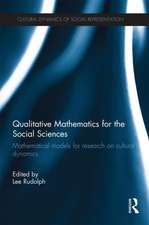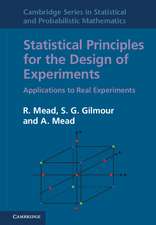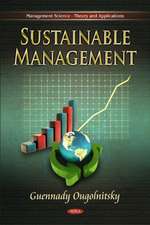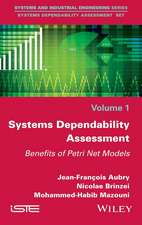Geostatistical and Geospatial Approaches for the Characterization of Natural Resources in the Environment: Challenges, Processes and Strategies
Editat de N. Janardhana Rajuen Limba Engleză Hardback – dec 2015
Mathematics plays a key part in the crust, mantle, oceans and atmosphere, creating climates that cause natural disasters, and influencing fundamental aspects of life-supporting systems and many other geological processes affecting Planet Earth. As such, it is essential to understand the synergy between the classical geosciences and mathematics, which can provide the methodological tools needed to tackle complex problems in modern geosciences.
The development of science and technology, transforming from a descriptive stage to a more quantitative stage, involves qualitative interpretations such as conceptual models that are complemented by quantification, e.g. numerical models, fast dynamic geologic models, deterministic and stochastic models. Due to the increasing complexity of the problems faced by today’s geoscientists, joint efforts to establish new conceptual and numerical models and develop new paradigms are called for.
Preț: 1624.31 lei
Preț vechi: 2137.25 lei
-24% Nou
Puncte Express: 2436
Preț estimativ în valută:
310.85€ • 337.54$ • 261.11£
310.85€ • 337.54$ • 261.11£
Carte tipărită la comandă
Livrare economică 18-24 aprilie
Preluare comenzi: 021 569.72.76
Specificații
ISBN-13: 9783319186627
ISBN-10: 3319186620
Pagini: 969
Ilustrații: XXIV, 969 p. 390 illus., 295 illus. in color.
Dimensiuni: 155 x 235 x 44 mm
Ediția:1st ed. 2016
Editura: Springer International Publishing
Colecția Springer
Locul publicării:Cham, Switzerland
ISBN-10: 3319186620
Pagini: 969
Ilustrații: XXIV, 969 p. 390 illus., 295 illus. in color.
Dimensiuni: 155 x 235 x 44 mm
Ediția:1st ed. 2016
Editura: Springer International Publishing
Colecția Springer
Locul publicării:Cham, Switzerland
Public țintă
ResearchCuprins
Singularity-Based Geo-Information Extraction for Characterizing Mineralization-Associated Geological Processes in Gejiu Mineral District, China.- Compositionally Compliant Contact Analysis.- Kernel Principal Component Analysis in the Application of Geochemical Comprehensive Feature Extraction.- Abnormal Extraction of Geochemical Data Based on Kalman Filter and SVM.- Summed Area Table for Rapid Local Singularity Mapping.- Application of a Coherent Multi-Dimensional Technique to the Central Part of the Mexican Volcanic Belt.- Multivariate Grid-Free Geostatistical Simulation of Natural Phenomena.- Semianalytical Solutions for Multispecies Transport Coupled with a Sequential First-Order Reaction Network using GITT Techniques.- Compositional Statistical Analysis of Inter-Laboratory Comparisons of Geothermal Water.- Fractal Characterization via Morphological Analysis.- Geostatistical Analysis of Functional Compositions: Characterization of Soil Particle-Size Curves through the Aitchison Geometry.- Classical Statistical Techniques for Deciphering the Origin and Evolution of Volcanoes at Volcanic Front of the Central Part of the Mexican Volcanic Belt.- Forecasting of Hollows in Abandoned Shallow Coalmines in Zone of Intensive Weathering.- Metallurgical Variable Re-expression for Geostatistics.- Parameter Estimation and Sensitivity Analysis in Clastic Sedimentation Modeling.- Study on Chaotic Time Series and Its Application on Forecasting Water Inrush in Mines.- p-T Computation Schemes for Thermodynamic Properties of Pure Water: A Comparative Evaluation of IAPWS-95 and IAPWS-IF97 Formulations.- Statistical Lobe Hierarchy Constraint in Surface-based Reservoir Modeling 60.- Transport of Molecular Fluids through Three-Dimensional Porous Media 63.- Statistical Scale-up of Reservoir Properties and Dispersivities in Heterogeneous Reservoirs.- Sediment Concentration Prediction at Gangotri in the Himalayas Using Artificial Neural Networks.- Lacunarity Analysis of Fracture Intensity Maps: Are they Multifractals?.- Modified Tetrahedral Mesh Subdivision Method and Its Application in 3D Geological Body Discrete Analysis.- High Performance Computing of Hydrothermal Ore-Forming Systems: An Approach Based on the Lattice Boltzmann Method.- Resurrecting GSLIB by Code Optimization and Multi-core Programming.- Distribution Law for Mineral and Chemical Constituent Fractions in Rocks and Ores.- Comparison of Spatial Interpolation Methods for Mapping Rainfall in Indian Himalayas of Uttarakhand Region.- A Time Series Analysis of Spatial and Temporal Distribution of Rainfall at Pampa River basin, Kerala, India.- Rainfall Statistics Change in West Bengal (India) from Period 1901-2000.- Groundwater Fluctuation and Trend in Amritsar, Punjab, India.- Groundwater Quality Appraisal in parts of Dun Valley Aquifers in the Terai Region, Central Nepal.- GIS and Geostatistical Assessment of Groundwater and Its Pollution in Kuwait.- Geomorphological Influence on Groundwater Quality and Arsenic Distribution in Parts of' Brahmaputra River Basin Adjoining Eastern Himalayas.- Vulnerability of Ground Water Quality to Changing Climate - A Case Study from Kalpitiya Peninsula, Sri Lanka.- Hydrogeochemical Assessment to Explore the Extent, Nature and Source of Fluoride Contamination Within the Groundwaters of the Panda River Basin, Sonbhadra District, Uttar Pradesh, India.- Presence of Uranium in Groundwater of Punjab: An Overview.- Groundwater Sources in Semi-Arid Regions and their Vulnerability to Climate Change: Drâa Catchment, Morocco.- Assessment of Groundwater Recharge due to Monsoon in Ozar Watershed of Maharashtra State Using Isotopic Technique.- Application of Statistical Techniques to Identify the Hydrogeochemical Processes in Coastal Aquifers of Pondicherry Region- Tamil Nadu.- Isotope Hydrogeological Factors Control Transport of Radon-222 in Hard Rock Fractured Aquifer of Bangalore, Karnataka.- Groundwater Arsenic Contamination Affecting Different Geological Domains in India: Its Relation to Fluvial Geomorphology and Quaternary Stratigraphy.- Ground Water Sustainability in Varanasi District, Uttar Pradesh: Current Situation and Need for Effective Strategies.- Discharge Pattern in the Gunt Valley, Western Pamir, with respect to δ2H, δ18O and Hydrochemistry.- Environmental Isotope Investigation to Understand the Groundwater Recharge from Irrigation Tanks in Thirumal Area, Madurai.- Quantitative Provenance Analysis of Sediments in the Changjiang (Yangtze) River (China).- Textural Variations of Sediments in the Course of a Small River: A Case Study from Khurar River, Khajuraho, Chhaterpur district, Madhya Pradesh, India.- Particle Size Characteristics of Ramganga Catchment Area of Ganga River.- Spatial and Temporal Variability in Grain Sizes of Alaknanda River.- Characterization of the Rainfall of Central Mozambique Based on Isotopes of Water.- Control of Deteriorating Water Quality in Extracted Boreholes by Flow Systems Definition.- Canal Irrigation and Its Impact on Spatial and Temporal Variation in Groundwater Level: A Case Study in Indira Gandhi Canal Project Stage I Command Area.- Impact of Canal Recharge on Groundwater Quality of Kolayat Area, District Bikaner, India.- Domestic Wastewater Treatment Using Tanfloc: A Tannin Based Coagulant.- Persistent Pesticides in Fluvial Sediment and Their Relationship with Black Carbon.- Relationship between Physicochemical Parameters and Toxicity of Leachate from Municipal Solid Waste Landfill Site in Delhi.- Effects of Coal Mining Activities on Soil Properties with Special Reference to Heavy Metals.- Coal Mining and Organic Pollutants: A Case of Mahanadi Basin Coalfields, India.- Impact of Tillage and Residue Management Practices on Soil Aggregates and Soil Organic Carbon.- Effect of Landcover on Soil Particle Size and Organic Carbon in Plough Layer.- Sodicity Status of Salt-Affected Soils of Israna, Haryana, India.- Characterizing and Quantifying the Effect of Aerosol Optical Depth over North Indian Plain during Harvesting Season.- Evaluation of Urban Air Pollution Distribution in the Colombo Municipal Council Area, Sri Lanka.- Platinum, Palladium and Rhodium in Road Dust/Top Soils from Major South Indian Cities: Implications on Environment and Human Health.- Longer Growing Season Decreases Peak Summer Vegetation Productivity in North American Ecosystems.- Species Diversity and Regeneration Status in Sabaiya Collaborative Forest, Nepal.- Treatment of Coke Oven Effluents by Duckweeds Ponds – A Laboratory Scale Study.- Zonal Crustal Movement.- Tectonic Setting of Basic Rocks of Borborema Province, Brazil, Inferred from Multi-Dimensional Discrimination Diagrams.- Tectonomagmatic Origin of Igneous Rocks from the Western Mexican Volcanic Belt.- Global Sub-Crustal Stress Field.- A Blind-wavelet Algorithm and Its Application to the Metal Mine Seismic Data Processing.- Study of N-dimensional Matrices and Its Application in Geology.- Small- to Large-Scale Rock Fracture Patterns as Indicators of Shock-Related Fragmentation.- Distribution Study of Ore-Sourced Elements from a Long Drill-Core in a Loess-Covered Area.- Hydrothermal Activity in the NE portion of the Sewell Rise, Central Andaman Trough: Evidences from Multibeam and Petrographic Studies.- Studies on the Seismicity in Garhwal Himalaya, India.- Shear Seam in Dam Foundation System.- Geothermobarometry and Barrovian Metamorphism of Darjeeling-Mangpu Region, Eastern Himalaya.- High-Pressure and Ultrahigh-Temperature Metamorphism at Diguva Sonaba, Eastern Ghats Mobile Bell (India): New Constraints from Phase Equilibria Modeling.- Spatial Distribution of Seismic Site Coefficients for Guwahati City.- Application of GIS-Based Weights of Evidence Method for Metallogenic Prediction to Copper Resources in Western Region of Zhejiang, China.- Application of Fuzzy Gamma Operator in Landslide Susceptibility Mapping Along Yercaud Ghat Road Section, Tamilnadu, India.- A Benchmark Synthetic Dataset for Fractured Reservoir.- Three-Dimensional Metallogenic Prediction in Tonglushan Region Based on Digital Ore Deposit Model.- The Integration Model of Deep Structure and Ore-Forming Systems of the Pechenga District (Baltic Shield).- Joint Conditional Simulation of an Iron Ore Deposit Using Minimum or Maximum Autocorrelation Factor Transformation.- Digital Modeling in the Study of Heavy Mineral Placers.- Working with Hierarchical Databases in R to Model Geometallurgical Data.- Application of Empirical Model Decomposition and Independent Component Analysis to Magnetic Anomalies Separation: A Case Study for Gobi Desert Coverage in Eastern Tianshan, China.- 3D Modeling of Urban Geological Body Based on the KDA Method for Beijing City, China.- Generalized Compensation Model for the Gravimetric Moho Recovery.- Colloidal Transport under Nonlinear Sorption in a Single Variable Fracture Aperture.- A Markov Chain Monte Carlo-based Particle Filter Approach for Spatiotemporal Modelling of an EnvironmentalProcess.- Using Stratigraphic Forward Modeling to Model the Brookian Sequence of the Alaska North Slope.- Numerical Simulation of Migration of Seismic Activity (On the Example of Kamchatka).- Comparative Performance of Thirteen Single Outlier Discordancy Tests from Monte Carlo Simulations.- 3D Crustal Temperature Modeling over Japan for Geothermal Resource Assessment.- A Nonstationary Nonlinear Geostatistical Model and Its Application in a Beach Sand Deposit for Recoverable Reserve Estimation.- Contextualized Geographically Weighted Principal Components Analysis for Investigating Baseline Soils Data on the North Wyke Farm Platform.- Downscaling of Precipitation in Mahanadi Basin, India using Support Vector Machine, K-Nearest Neighbor and Hybrid of Support Vector Machine with K-Nearest Neighbor.- A Precipitation-Runoff Simulation Model for Flood Forecasting of River Tel, Odisha, India.- Dynamics of Overland Flow under Changing Cropping Pattern: A Spatial Modeling Approach in Penganga Sub-watershed.- Challenges of Including Groundwater Depth in a Liquefaction Loss Model.- Stochastic Quantification of Low-Resolution Geocoding Uncertainty and Its Application to Catastrophe Modeling.- An Improvised Effective Oceanography Monitoring using Large Area Underwater Sensor Networks.- The Extraction of Oil and Gas Information by Using SAS Imagery in the Jimusaer Field, Xinjiang-Clay Alteration Minerals.- Characterization of Sampling Error in Instantaneous Orbital Data Products of TRMM over Indian Subcontinent.- Estimation of Regional Groundwater System in a Granitic Body by 3D Permeable Zone Modeling and Flow Simulation.- Hyperspectral Image Classification Using a New Dictionary Learning Approach with Structured Sparse Representation.- Estimating Land Surface Temperature and Its Lapse Rate over Kashmir Valley Using MODIS Data.- Combining Quantitation of Remote Sensing Information of Local Structures and Calculation of Structural Stress Field.- Research on GIS-Based 3D Prospectivity Mapping and a Case Study of Jiama Copper-Polymetallic Deposit in Tibet, China.- Inferring Land Surface Processes from Watershed Characterization.- Investigation of Seepage Channel Using Remote Sensing Technique in Jodhpur City, Rajasthan.- Monitoring Snow Cover Area Using Different Algorithms on Indian Remote Sensing Data.- Optimization of Neural Networks for Multisource Classification in a Glaciated Terrain.- Generation of Stream Length Gradient Index Map Using Visual Basic Program – A Case Study from South India.- Three Dimensional Quantitative Extraction and Integration for Geosciences Information: A Case Study of Nannihu Mo Deposit Area.- Multi-Classifier Fusion for Land Use Land Cover Mapping in Jharia Coal Field.- Land Use and Land Cover Changes and Their Impacts on Floods in Pampa River Basin in Kerala: A Remote Sensing Based Analysis.- Spatio-Temporal Study of the Distribution of Land Use and Land Cover Change Pattern in Chandigarh, India using Remote Sensing and GIS Techniques.- Development of Technique to Characterize TROF.- Study of the Urban Green Space Planning Using Geographic Information Systems and Remote Sensing Approaches for the City of Colombo, Sri Lanka.- Prediction of Crop Suitability of Certain Indian Spices –A GIS Approach.- Morphometric and Hydrological Study of Alaknanda and Bhagirathi Basins.- Role of Remote Sensing Data in Geoenvironmental Mapping: Case Studies from Syria.- Integrating Smart Platforms to Analyze Energy Patterns in Academic Building.- An Integrated Golden Spike Information Portal Enabled by Data Visualization and Semantic Web Technologies.- Web-based Facility Management System using Open Source GIS.- Estimation of Wind Speed in the Suburban Atmospheric Surface Layer.- Role of Arabian Sea Surface Pressure on Indian Northeast Monsoon.- Effect of Dust on the Indian Summer Monsoon.- Study of Physical and Dynamical Processes in the Ionosphere at Equatorial Anomaly Crest Region during Magnetic Storm for High and Low Solar Activity Period.- Winter Hailstorm over New Delhi, India.- Spatio-Temporal Variability of Rainfall and Temperature in Northeast India.- Surface Energy and Mass Balance on the Ablation Zone of Chorabari Glacier, Central Himalaya, India.- Monitoring the Status of Siachen Glacier using Multi Temporal Remote Sensing Approach.- Monitoring Glacial Parameters in Parts of Zanskar Basin, Jammu and Kashmir.- An Analysis of Pattern of Changes in Snow Cover in the Upper Beas River Basin, Western Himalaya.- Stream Flow Changes and Glacier Recession in the Upper Indus Basin.- Hydrological Modeling and Streamflow Characterization of Gangotri Glacier.- Abundance of Cycladophora davisiana used as an Indicator for Paleoenvironment of Kerguelen Plateau, Southern Ocean Region.- Conservation Agriculture – A New Paradigm for Climate Change Mitigation in Rainfed Indian Agriculture.- Perspective of the Agriculture Development of the Mountain Areas in Modern Condition of Climate Change.- In the Face of Changing Climate: Groundwater Development through Artificial Recharge in Hard Rock Terrain of Kumaun Lesser Himalaya.- Sustainable Biochar – A Tool for Climate Change Mitigation, Soil Management and Water and Wastewater Treatment.- Modelling Paleo-Geomorphology of Wave-Dominated Sandy and Tide-Influenced Muddy Coastal Embayments on the Decadal to Centennial Scale: A Comparative Study.- A First-order Non-linear Differential Equation Characterizing Multiple Types of Probability Distributions.- Author Index.
Recenzii
“The editor has to be commended for the non-trivial task of editing this large compilation of chapters of diverse studies. The book is an abundant source of case studies of quantitative analyses of scientific issues relevant to characterization and assessment of natural resources and processes. The book is suitable for postgraduate research students with advanced knowledge of mathematics and statistics, as well as for junior and senior researchers.” (John Carranza, Natural Resources Research, October, 2016)
Textul de pe ultima copertă
These proceedings of the IAMG 2014 conference in New Delhi explore the current state of the art and inform readers about the latest geostatistical and space-based technologies for assessment and management in the contexts of natural resource exploration, environmental pollution, hazards and natural disaster research. The proceedings cover 3D visualization, time-series analysis, environmental geochemistry, numerical solutions in hydrology and hydrogeology, geotechnical engineering, multivariate geostatistics, disaster management, fractal modeling, petroleum exploration, geoinformatics, sedimentary basin analysis, spatiotemporal modeling, digital rock geophysics, advanced mining assessment and glacial studies, and range from the laboratory to integrated field studies.
Mathematics plays a key part in the crust, mantle, oceans and atmosphere, creating climates that cause natural disasters, and influencing fundamental aspects of life-supporting systems and many other geological processes affecting Planet Earth. As such, it is essential to understand the synergy between the classical geosciences and mathematics, which can provide the methodological tools needed to tackle complex problems in modern geosciences.
The development of science and technology, transforming from a descriptive stage to a more quantitative stage, involves qualitative interpretations such as conceptual models that are complemented by quantification, e.g. numerical models, fast dynamic geologic models, deterministic and stochastic models. Due to the increasing complexity of the problems faced by today’s geoscientists, joint efforts to establish new conceptual and numerical models and develop new paradigms are called for.
Mathematics plays a key part in the crust, mantle, oceans and atmosphere, creating climates that cause natural disasters, and influencing fundamental aspects of life-supporting systems and many other geological processes affecting Planet Earth. As such, it is essential to understand the synergy between the classical geosciences and mathematics, which can provide the methodological tools needed to tackle complex problems in modern geosciences.
The development of science and technology, transforming from a descriptive stage to a more quantitative stage, involves qualitative interpretations such as conceptual models that are complemented by quantification, e.g. numerical models, fast dynamic geologic models, deterministic and stochastic models. Due to the increasing complexity of the problems faced by today’s geoscientists, joint efforts to establish new conceptual and numerical models and develop new paradigms are called for.
Caracteristici
Constitutes a laboratory for integrated field studies of mathematical geosciences Includes methodological tools to tackle the complex problems in modern geosciences Introduces 3D visualization models used to address geomathematical issues
